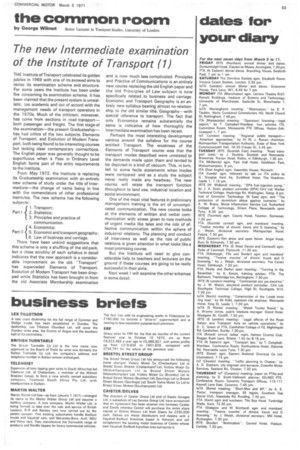The new Intermediate examination of the Institute of Transport (1)
Page 55

If you've noticed an error in this article please click here to report it so we can fix it.
THE Institute of Transport celebrated its golden jubilee in 1969 with one of its avowed aims to revise its examination scheme and structure. For some years the Institute has been under fire concerning its examination scheme. It has been claimed that the present system is unrealistic, too academic and out of accord with the management needs of transport operators in the 1970s. Much of the criticism, moreover, has come from sections in road transportboth passenger and freight. The first stage of the examination-the present Graduateshiphas had critics of the two subjects. Elements of Transport, and Evolution of Modern Transport, both being found to be interesting courses but lacking clear contemporary connections. The English paper was generally thought to be superfluous when a Pass in Ordinary Level English forms part of the entry requirements to the Institute.
From May 1972, the institute is replacing its Graduateship examination with an entirely new scheme of study under the title of Intermediate-the change of name being in line with the nomenclature of other professional institutes. The new scheme has the following subjects: {1. Transport; Part I 2. Statistics: 3. Principles and practice of communication. 3. Principles and practice of communication.
/ 4. Economics: / Part II 5. Economic and transport geography; 6. Law of business and carriage. There have been unkind suggestions that this scheme is only a shuffling of the old pack, but a close scrutiny of each syllabus in detail indicates that the new approach is a considerable improvement on the old. "Transport" has superceded Elements of Transport, Evolution of Modern Transport has been dropped while Statistics has been brought in from the old Associate Membership examination and is now much less complicated. Principles and Practice of Communications is an entirely new course replacing the old English paper and the old Principles of Law subject is now specifically related to business and carriage. Economic and Transport Geography is an entirely new syllabus bearing almost no relationship to the old similar title. Geography-with special reference to transport. The fact that only Economics remains substantially the same is indicative of how thoroughly the Intermediate examination has been recast.
Perhaps the most interesting development centres around the syllabus for the course entitled Transport. The weakness of the Elements of Transport course was that the transport modes described were unrelated to the demands made upon them and tended to be depicted in a kind of vacuum. This, in turn, led to some facile statements when modes were compared and as a study the subject never really made any headway. The new course will relate the transport function throughout to land use, industrial location and social environment.
One of the most vital features in preliminary management training is the art of uncomplicated communication. The new course looks at the elements of written and verbal communication with stress given to new methods of urgent media like telex and the role of effective communication within the sphere of industrial relations. The planning and conduct of interviews as well as the role of public relations is given attention in what looks like a most promising course.
But the Institute will need to give considerable help to teachers and lecturers on the ground if these courses are going to be really successful in their aims.
Next week I will examine the other schemes in some detail.




































































































